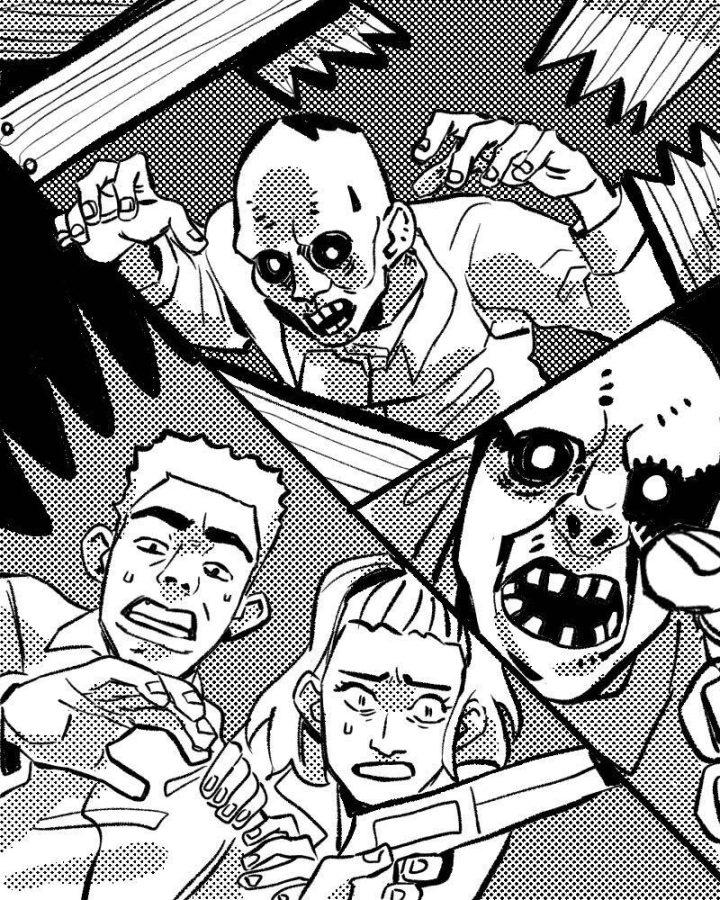University Library System offers a look into George A. Romero’s unproduced young adult screenplays
September 23, 2022
Beyond George A. Romero’s iconic “Night of the Living Dead” franchise, which influenced countless horror movies, Romero had a number of unfinished projects aimed at young adults.
Ben Rubin, Pitt Horror Studies Collection coordinator, said these projects were overall unsuitable for a younger audience when Romero first wrote them in the mid-90’s.
“It’s sort of ironic that these projects never would have gotten off the ground with this audience since I know myself and so many others, we first encountered Romero’s work when we were exactly the age this YA audience was intended for 一 even if we were actually watching adult work,” Rubin said.
Pitt’s University Library System hosted a remote seminar on Zoom titled “Youthful Frights: Exploring George A. Romero’s Young Adult Horror” on Tuesday. Rubin co-hosted the event with Gray O’Reilly, a senior film and media studies major.
The pair discussed two mid-90’s unproduced screenplays from Romero including “Goosebumps: Welcome to Dead House,” and an original unpublished Romero screenplay titled “Moonshadows.” They presented highlights of the scripts, analyses of their content and comparisons to Romero’s other films.
Although Romero was born in New York, he attended Carnegie Mellon University in the late 1950s and got his filmmaking start in Pittsburgh, where he made TV commercials as well as sequences for “Mister Rogers’ Neighborhood.” These combined experiences led to him directing and writing the 1968 horror classic “Night of the Living Dead,” which infuses both social commentary and horror in a way unseen prior.
According to Rubin, the screenplays were not the first time Romero wrote for a younger audience. Rubin said French publisher Éditions du Seuil contracted Romero to write a children’s book in 1994 一 the publisher sought out authors who wouldn’t traditionally write for children.
“He wrote the story about these giant monsters … and they, despite being giant, were very peaceful and made good use of their environment. [They] are sort of terrorized by the humans who live on this world that are depleting the environment and taking away all their food,” Rubin said. “It definitely has trademark Romero social commentary that really leads into environmentalism and scarcity.”
The publishers translated the book into French and released it in Belgium, and most fans of Romero were unaware of the book. After Romero’s death in 2017, his widow Suzanne Desrocher initiated a posthumous rerelease of the book in English titled, “The Little World of Humongo Bongo,” according to Rubin.
After publishing the book in the mid-90’s, Romero continued to write despite not making many films, Rubin added. Among the writing includes a screenplay adaptation of “Goosebumps: Welcome to Dead House,” a book similar to Romero’s forte, as the main foe is zombies.
The story centers on a family who moves into a new town, without realizing that the undead, who survive off the lifeforce of the living, surround them. While their life forces are leeched, protagonists Josh and Amanda must save their parents and their own lives before it’s too late.
Comparing the screenplay to the book, O’Reilly noted there are a number of small changes that made the content fit Romero’s style more, but overall the plot was the same.
“Josh and Amanda are the original protagonists in the book, but they kind of switch places. In the book, Amanda was the more proactive point-of-view protagonist,” O’Reilly said. “We followed her mainly. But [in the screenplay] she has switched places with Josh, who gets that scaredy-cat, cowardly hero role that a lot of Goosebumps preteens kind of have.”
In addition, Romero’s main characters were from Pittsburgh, an homage to his college town.
“[“Welcome to Dead House” has] an element of social commentary that’s very common within Romero’s other movies. It has a very strong anti-capitalist message … that delves into the symbiotic relationship between what is essentially a dying coal town, and its inhabitants,” O’Reilly said.
Just as Romero continued his social commentary in his YA works, he also included violent scenes, unlike other Goosebumps adaptations, O’Reilly added. In one scene, after one character has a fatal heart attack and dies, Josh sneaks into the funeral home where her body is.
“He ends up in the embalming room where her body is stretched out on the slab. She gets up slowly, and she turns and looks at him, and this time, the rot and decay and how gross she looks, it’s not fake … She looks melted. The flesh on her face looks like runny play-doh bits of skull peeking through her left eye, a blank puddle,” O’Reilly said. “I could not imagine this scene being in the movie. If I had seen this as a kid I would have just ran screaming from the theater.”
Though it is unofficial, the main consensus for why Romero’s adaption wasn’t chosen was that it wouldn’t work for a younger audience, according to Rubin.
The webinar closed with a brief Q&A session, where Rubin and O’Reilly compared children’s media from the 90’s to media now.
“I think that we’ve gotten a lot less violent with our kids’ media, which is probably why I could not see a lot of the scenes that are in the Goosebumps script making it into a Goosebumps movie now,” O’Reilly said. “I think it’s gotten better in some regards, but it stayed the same in a lot of others.”



